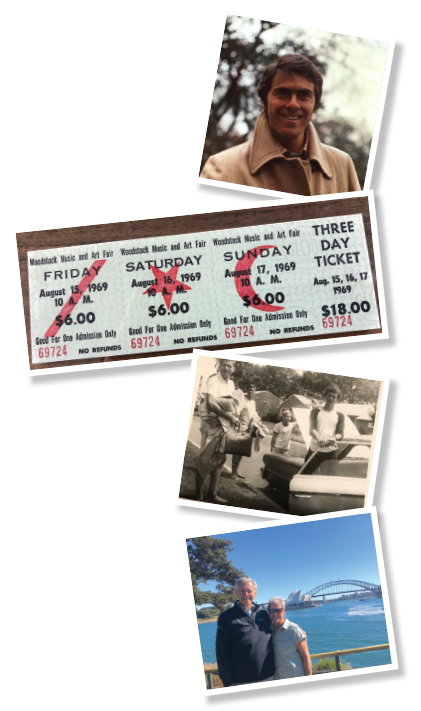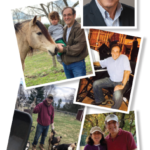When Eric S. Schned, MD, was 19 years old, he spotted a tiny ad in his local newspaper for a concert. As days and weeks passed, the ad grew bigger as bands were added to the lineup. He, his twin brother and two friends decided the concert “looked really cool” and purchased tickets. That may have been the best $18 they ever spent, says Dr. Schned.
Dr. Schned, who is partially retired and works six days a month at the New Ulm Medical Center, Minnesota, was one of an estimated 400,000 music lovers who attended Woodstock Music and Arts Fair, the iconic event held Aug. 15–18, 1969, on the Yasgur farm, Bethel, N.Y., roughly an hour outside the town of Woodstock.
Dirty, Hungry & Worth Every Second
Normally, the drive from Dr. Schned’s hometown—Asbury Park, N.J.—to the Yasgur farm would have taken roughly three hours. But after driving seven hours that Friday afternoon due to heavy traffic, he says he could still see miles of red tail lights in front of him on that single-lane country road.
“Everybody on the car radio was talking about this unbelievable thing going on,” he says. “Even The New York Times reported the third largest city in New York had formed at Yasgur’s farm.”
At midnight, Dr. Schned and his friends pulled off the road and drove into a field that was completely occupied with people in tents.
He and his friends pitched their tent but weren’t quite ready to settle down. After a few beers and lots of laughs, Dr. Schned recalls an angry man approached them.

First Photo: Dr. Schned, 1981
Second Photo: Original Woodstock tickets never collected at the event.
Third Photo: Returning from Woodstock on Sunday afternoon. From left: Dr. Schned’s twin brother, Alan, Dr. Schned, and two friends, Alan Kreisler and Mark Cohen. They’re barefoot because they threw away their mud-encrusted sneakers.
Fourth Photo: Dr. Schned and his wife, Nancy, in Sydney, in 2019
“His beard was down to his waist, and he was carrying a baby on his hip,” Dr. Schned says. “He looked at us and started hollering because we were making too much noise.
“We asked, ‘Why are you so mad? That’s why everyone is here, to have fun.’”
The next morning, Dr. Schned and his friends, along with thousands of others, began walking the five miles to the farm in the pouring rain. Assuming they could purchase food at the concert, Dr. Schned and his friends only carried the essentials: beer, blankets and watermelon.
Dr. Schned says people were everywhere. No one was collecting tickets. In the midst of the confusion, the group of friends made their way down to the field in front of the large amphitheater, adding there were many small campfires scattered around the field.
They quickly discovered the food stands were completely wiped out, he says. People had to walk in six inches of mud to reach any of the portable toilets.
But his memories of that weekend don’t focus on the rain, mud, lack of food, poor sanitary conditions, enormous crowds or the fact that one of his friends escaped injury after being hit by a car. No way. He prefers to remember the colorful people and amazing music that provided much needed relief and joy during a time of chaos.
Things turned “amazing” on Saturday night, he says. “The music was phenomenal, and the sound system was awesome. The musicians who stood out for me were Janis Joplin, The Grateful Dead, Creedence Clearwater Revival, and Sly and the Family Stone.”
Later that evening, Dr. Schned and his friends dozed off. Everyone slept on the ground. He recalls occasionally opening his eyes that night and seeing people partying, smoking dope and fornicating.
“It was quite the experience, quite the show,” he says, adding that the crowd was actually more eclectic than history records would allude. “There were plenty of people like us who didn’t do drugs, just drank some beers, had some fun and didn’t get wasted.”
On Sunday afternoon, Dr. Schned and his friends decided to head home and began walking back to their car. They were muddy, hungry, wet from the rain and tired. A driver, who was traveling at a slow speed, accidentally hit one of Dr. Schned’s friends. Fortunately, his friend wasn’t hurt.
“At the moment, it was funny,” he says. “We were all convinced the driver had to be stoned out of his mind.”
In Perspective
When Dr. Schned looks back at Woodstock now, he says it was really just one of many events during the 1960s and 1970s that helped form the attitudes and beliefs he still holds dear. He points to other significant events that impacted his life, such as the civil rights movement, the assassination of Martin Luther King Jr., and the Vietnam War.
“There was nothing about Woodstock that revolutionized my life,” he says, adding that his wife, Nancy, who was more of a hippie back then than him, has always been jealous of his Woodstock experience. “There was no epiphany or revelation, and I didn’t have any cosmic insights.”
The era was a time of tumultuous change, and Dr. Schned believes Woodstock was a reaction to all the tension people were feeling.
“All of those events helped open my eyes about a lot of things going on in America,” he explains. “I am proud that I still kept some of my idealism during all these years.”
And he does joke with friends about his Saturday night images of people smoking joints. He says observing the “field of joints” at Woodstock subconsciously influenced his career choice to the field of joints.
Carol Patton is a freelance writer based in Las Vegas.
Dr. Schned’s Career Highlights
1975: Graduated medical school; Columbia University, College of Physicians and Surgeons, New York
1978: Completed internship, junior and assistant residencies, Department of Internal Medicine, The New York Hospital, Cornell Medical Center (now called New York–Presbyterian/Weill Cornell Medical Center)
1979–81: Completed fellowship, Division of Rheumatic Diseases, the Hospital for Special Surgery, New York
1981–86: Clinical assistant professor, Department of Medicine, University of Minnesota, Minneapolis
1981–2017: Rheumatologist, Park Nicollet Clinic, Minneapolis
1989 to present: Rheumatologist, New Ulm Medical Center, Minnesota
1998–2006: Chair, Clinical Board of Governors, Park Nicollet, Minneapolis
1992–2013: Member, Board of Directors, Park Nicollet Health Services, Minneapolis
2001–04: Member, Board of Directors, ACR
2004–07; 2015–18: Member, Board of Directors, Rheumatology Research Foundation
2013–17: Member, Board of Directors, HealthPartners, Minneapolis


